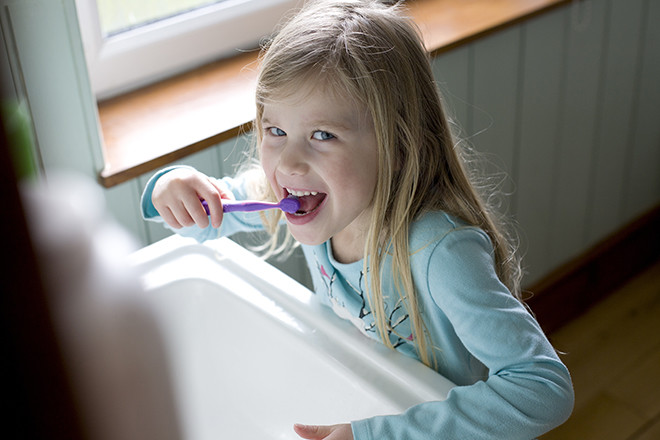 Photo:Getty ImagesYou should start brushing your child's teeth right when they appear in the mouth. Even the proud owners of a single tooth can carry out the necessary oral hygiene measures at the age of 5-6 months, or even earlier. Only two factors are enough for caries to occur: the presence of plaque and the lack of action to remove it, so during the first three years of a child's life, dental care is mostly the responsibility of parents. And later, it will not be superfluous to control the quality of brushing your teeth, otherwise problems with children's teeth will still catch up with you. If your child complains of a toothache, then know that you are already late with a visit to the dentist. Preventive visits to the doctor will bring much more benefit than a diagnosis of "pulpitis" established after the fact. In addition, a good relationship with the dentist is the key to the absence of fear in the event that medical intervention is still required. The appearance of teeth can be deceiving, so dentists recommend dropping in to visit them regularly, or more precisely - at least once every four to six months. There is a myth among parents that makes an experienced pediatric dentist shudder: supposedly someone once told someone that there is no need to treat them at all, they will fall out anyway. This information is not only untrue, but also extremely dangerous for your child's health. In fact, baby teeth, just like permanent teeth, have roots and nerves, which means they can cause pain and even be completely destroyed. A child gets a full set of first teeth at about two years old, and the change of baby teeth to permanent teeth ends at about 12 years of age. It is easy to calculate how long caries received at three years old will destroy, for example, chewing teeth, which are the last to change, without treatment. Agree that deliberately condemning your child to such suffering is simply monstrous. But putting in a filling now is as easy as pie. In dentistry, small patients are shown cartoons, distracted with toys and in every possible way contribute to facilitating the treatment process. Read also:
Photo:Getty ImagesYou should start brushing your child's teeth right when they appear in the mouth. Even the proud owners of a single tooth can carry out the necessary oral hygiene measures at the age of 5-6 months, or even earlier. Only two factors are enough for caries to occur: the presence of plaque and the lack of action to remove it, so during the first three years of a child's life, dental care is mostly the responsibility of parents. And later, it will not be superfluous to control the quality of brushing your teeth, otherwise problems with children's teeth will still catch up with you. If your child complains of a toothache, then know that you are already late with a visit to the dentist. Preventive visits to the doctor will bring much more benefit than a diagnosis of "pulpitis" established after the fact. In addition, a good relationship with the dentist is the key to the absence of fear in the event that medical intervention is still required. The appearance of teeth can be deceiving, so dentists recommend dropping in to visit them regularly, or more precisely - at least once every four to six months. There is a myth among parents that makes an experienced pediatric dentist shudder: supposedly someone once told someone that there is no need to treat them at all, they will fall out anyway. This information is not only untrue, but also extremely dangerous for your child's health. In fact, baby teeth, just like permanent teeth, have roots and nerves, which means they can cause pain and even be completely destroyed. A child gets a full set of first teeth at about two years old, and the change of baby teeth to permanent teeth ends at about 12 years of age. It is easy to calculate how long caries received at three years old will destroy, for example, chewing teeth, which are the last to change, without treatment. Agree that deliberately condemning your child to such suffering is simply monstrous. But putting in a filling now is as easy as pie. In dentistry, small patients are shown cartoons, distracted with toys and in every possible way contribute to facilitating the treatment process. Read also:

Making Money with Desserts: Success Stories
Evgeniya Polischuk (Fedutinova) instagram:@evgeniyafedutinovavk.com/janeshomebaking– It all started with baking for family and friends. Gradually, I started posting photos of my baked goods on Instagram – and orders started coming in. I made my first custom-made cake on October 13, 2014, and a little earlier I started making macaroons and cupcakes. You could say that the business “found me”, I am very […]

Soups are cold recipes with photos
Cold cucumber soup with yogurt and lemonsorbet from the chef of the restaurant La Taverna Alexander Zhurkin Photo: Getty Images Ingredients: Plain yoghurt – 125 g Cucumber – 150 g Lemon/lime sorbet – 50 g Cocktail shrimp – 24 g Fresh ginger juice – 1 g Lime juice – 5 g Fresh orange juice – 5 g Parsley – 1 g Pink pepper – 1 g Watercress – […]

barbeque kebab
Pork tenderloin in glaze Photo:Dmitry Bayrak/dbstudioPreparation time: 20 minutes + marinating time.Calories: 454 kcal per serving.For 4 servings: 4 pork tenderloins (approximately 300 g each), 1 onion, 2 cloves of garlic, 1 tsp. lemon zest, 1 tsp. lemon juice, a pinch of ground cumin, coriander and turmeric, 1 tbsp. vegetable […]

Pierre Duacan: dietary recipes: Ducane diet
Beetroot soup Photo:Season’S, Luxury Hotels RepresentationYou will need:· Boiled beetroot – 60 g· Fresh cucumbers – 20 g· Red radish – 20 g· Green onions – 10 g· Egg – 1 pc.· Drinking mineral water – 200 g· Salt – 1 gPreparation:· Boil the egg and beetroot.· Grate the cucumbers, radish and part of the beetroot. Put everything […]





